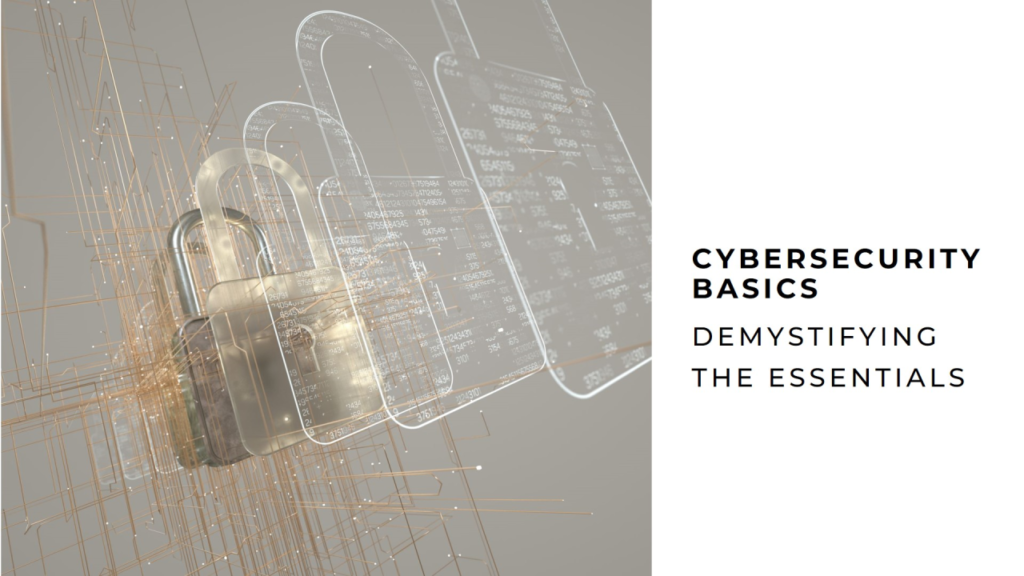
In today’s digital age, cybersecurity has become a critical concern for individuals and organizations alike. With cyber threats evolving rapidly, understanding the basics of cybersecurity is essential for protecting sensitive information and ensuring digital safety. In this article, we’ll explore the fundamentals of cybersecurity, demystifying common terminology and highlighting key principles to help you navigate the complex landscape of online security.
What is Cybersecurity?
At its core, cybersecurity refers to the practice of protecting computers, networks, and data from unauthorized access, theft, or damage. It encompasses a wide range of technologies, processes, and practices designed to safeguard digital assets and mitigate cyber risks. From individual users to large enterprises, everyone has a role to play in ensuring cybersecurity.
Common Threats and Risks
Cyber threats come in many forms, ranging from malicious software (malware) to social engineering attacks. Some of the most common cybersecurity threats include:
- Malware: Malicious software designed to infiltrate systems and steal data, disrupt operations, or cause damage.
- Phishing: Fraudulent attempts to deceive individuals into revealing sensitive information, such as passwords or financial details, through emails, messages, or fake websites.
- Ransomware: Malware that encrypts files or systems, rendering them inaccessible until a ransom is paid.
- Data Breaches: Unauthorized access to sensitive data, leading to its theft or exposure, often resulting in financial loss and reputational damage.
- Denial-of-Service (DoS) Attacks: Attempts to disrupt or overload networks or systems, causing them to become unavailable to legitimate users.
Key Principles of Cybersecurity
Effective cybersecurity relies on several key principles:
- Confidentiality: Ensuring that sensitive information is accessible only to authorized individuals or systems.
- Integrity: Maintaining the accuracy and reliability of data by protecting it from unauthorized alteration or modification.
- Availability: Ensuring that systems and data are accessible and usable when needed, despite potential disruptions or attacks.
- Authentication: Verifying the identity of users or systems to prevent unauthorized access.
- Authorization: Granting appropriate permissions and access rights to authorized users or systems based on predefined roles and privileges.
- Security Awareness: Educating users about common threats and best practices to reduce the risk of security incidents.
How Intellectz AI Can Help
At Intellectz AI, we understand the importance of cybersecurity in today’s interconnected world. Our innovative solutions leverage cutting-edge technologies to protect individuals and organizations from cyber threats, offering comprehensive protection against malware, phishing, ransomware, and more. With our expertise and commitment to excellence, we empower our clients to navigate the digital landscape with confidence, knowing that their data and systems are secure.
In conclusion, cybersecurity is a complex but essential aspect of our digital lives. By understanding the basics of cybersecurity and implementing best practices, we can all play a role in safeguarding our digital assets and preserving online safety. With the right knowledge and tools, we can stay one step ahead of cyber threats and protect what matters most.
Stay tuned for more insights and tips on cybersecurity from Intellectz AI!
www.intellectzai.com
#cybersecuritysolutions #cloudsolutions #marketingservices #smallbusiness #growthhacking #scalability #atlanticcanada #novascotia #halifax #atlanticcanadacybersecurity #nssmallbusiness #halifaxbusiness #Endpointsecuritysolutions #atlanticcanadasmallbusiness #smbcybersecurity #halifaxmarketingservices #Cybersecurityconsultingservices #Securityawarenesstraining #Managedsecurityservices #Networksecurityservices
